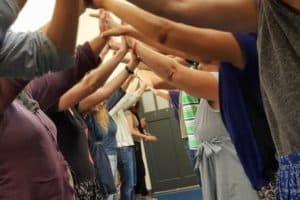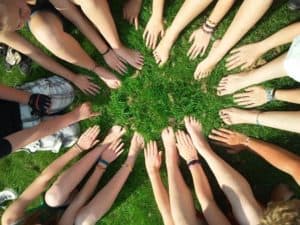Hakhel Resources: Connect via Judaism
A unique resource library for Jewish Intentional Communities.
Inspiration. Tools. Support.
Small Town and Big Town
by Rabbi Yosef Yitzchak Schneorsson
Looking at the connections between internal and external, spiritual and physical surroundings, this is an open invitation for your thoughts. Rabbi Yosef Yitzchak Schneorsson leads you there.
Section: Connect via Judaism
Tags: Jewish Spirit
Realigning the Synagogue Playbook
by Eli Talk Rabbi Jeremy Fine
What is the ideal relationship between the Rabbi and his community? How does this role change in different types of settings?
Section: Connect via Judaism
Intentional Community
by Leah Josephson
A deeper dive into the origins of the intentional community movement
Section: Connect via Judaism
Intentional Communities
by Aharon Ariel Lavi
Why is it so crucial for us to find meaning in what we are doing? And how can community become the anchor of meaningful existance?
Section: Connect via Judaism
Individual and Community
by Aharon Ariel Lavi
What is the difference between charity and welfare? And why is it so relevant in a community setting? A collection of sources will provide you with some food for thought.
Section: Connect via Judaism
Tags: Alliance and Unity
Happiness and a Broken Heart
by Aharon Ariel Lavi
The human heart is an inspiring thing. Some insights from Rabbi Nachman of Breslov exploring what makes the human condition so unique.
Section: Connect via Judaism
Egypt and Technology
by Aharon Ariel Lavi
In our hyper-technological society, the mere connection between humaniy and nature becoms a question. Jewish sources can inspire our exploration in that direction
Do a go around and share the most natural experience you evenr had, and the most artificial one. To what extent did each one inspire or energize you? What do miss and gain when connecting with nature? What do we miss and gain when moving away from it towards technological lives?
Section: Connect via Judaism
Do I want a Connection or a Community?
by Scott Bolton
An exploration of the human desire for connection- what can quench the need for connection, and is community the only answer?
Section: Connect via Judaism
Tags: Jewish Spirit
7 Habits of Highly United Jews
by Eli Talk David Bratslavsky
Try to imagine what could be to achieved if your community was more united. This resource will provide you with seven tools to acheive this.
Ask your partners and yourself: In what way are we modeling unity? How is our internal dialog reflecting openness and unity?
Section: Connect via Judaism
Tags: Alliance and Unity, Jewish Spirit
Love Your Fellow
by Danny Gold
How is it that in communities build around social activism, the core value of loving your neighbour can be forgotton? This resource can help you get to the bottom of the problem
Design an event dedicated to this theme. Let the children offer an activity, where they can play their role in the community
Section: Connect via Education, Connect via Judaism
An ELI Talk by Karina Zilberman
by Karina Zilberman
"Play is the exhaltation of the possible" said Martin Buber. Where can a leader create such space in the community? What does it take to get beyond the barrier of skepticism? A wonderful talk!
Tell a bit about the 'Let's try it!' voice within yourself. What are the stands in the way for this voice, internally and externally?
The Individual and the Community
by Jonathan Dickens
For many people, joining a community can require a change of mindset. This article gives insight into the process the indiviual goes through upon joining a community as well as the process a community goes through when new members join.
Section: Care for Community, Connect via Judaism
Outreach and Never Giving up on Someone
by Jamie Cohen
Inclusiveness and pluralism have become cornerstone vlues of our generation, and yet they are not easy to implememnt and accomplish. This collection of texts will take on a journey to explore the meaning of boundaries, "the other" and the inner circle.
While studying the texts, try to write down and share the main characteristics of your community. whatm akes it what it is? What is its identity? After defining what your community is, ask yourselves what is not? Where do we draw the line between "inside" and "outside", and how do we treat people respectfully on both sides of the line?
Section: Care for Community, Connect via Judaism
Communal Prayer – ????? ?????? Why I need you.
by Ben Gross
This resource looks at the power of communal togetherness form the perspective of the text of the Amida prayer.
Section: Care for Community, Connect via Judaism
Lo Titgodedu: Do Not Separate Yourself from the Community
by Eryn London
Being alone is defined as the first "not good" thing in the Torah, and leads to the creation of the first companionship. Along the same line, the commandment of "Lo Titgodedoo" means that we should not separate ourselves from one antoher even when we have deep disagreements.
After learning the sources ask yourself what do they mean to you as a community? Try to map out up to 3 major conflicts and/or disagreements you have within the community and ask yourselves what is more important: to be right or to be together?
Section: Care for Community, Connect via Judaism
Tags: Community Resilience, Loneliness










